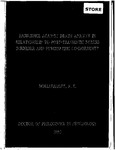Resilience against death anxiety in relationship to post-traumatic stress disorder and psychiatric co-morbidity
| dc.contributor.supervisor | Chung, Man | |
| dc.contributor.author | Hoelterhoff, Mark | |
| dc.contributor.other | Faculty of Science and Engineering | en_US |
| dc.date.accessioned | 2011-01-10T09:02:20Z | |
| dc.date.available | 2011-01-10T09:02:20Z | |
| dc.date.issued | 2010 | |
| dc.date.issued | 2010 | |
| dc.identifier | 10016216 | en_US |
| dc.identifier.uri | http://hdl.handle.net/10026.1/306 | |
| dc.description.abstract |
Research was conducted examining death anxiety from existential, psychodynamic, cognitive and sociological perspectives. The intent was to consider the role of death anxiety on well-being; four studies were conducted to examine how death anxiety influenced PTSD and mental health among people who have experienced a life-threatening event. These studies were conducted using undergraduate university students in Lithuania. The first study used a mixed-method design and in phase 1, participants (N=97) completed self-report questionnaires that gathered information on demographics, death anxiety, trauma and well-being. Results indicated a significant correlation between death anxiety and PTSD, but not psychiatric co-morbidity. Phase 2 attempted to further explore the phenomenological experience of participants with full PTSD, and 6 semi-structured interviews were conducted. IPA analysis found three major themes in response to the life-threatening event; self-efficacy, religious coping and existential attitude. Subsequent studies were then conducted to understand these themes as possible factors of death anxiety resilience in regards to life-threatening events. The second study (N=109) examined the role of self-efficacy and found that it was significantly related to death anxiety and psychiatric co-morbidity, but not PTSD. The third study (N=104) examined religious coping, but did not find evidence to support its significance; however again self-efficacy emerged as significantly related to psychiatric co-morbidity and death anxiety. The fourth study (N=110) looked at the role of existential attitude via posttraumatic growth and sense of coherence. Although posttraumatic growth did influence PTSD, existential attitude was not a significant factor for death anxiety or outcomes. However, self-efficacy again emerged as related to death anxiety and psychiatric co-morbidity. In studies two to four, self-efficacy did not act as a mediating factor and was independently related to death anxiety and psychiatric co-morbidity. Results were discussed in light of theories regarding death anxiety and their application to clinical treatment. | en_US |
| dc.language.iso | en | en_US |
| dc.publisher | University of Plymouth | en_US |
| dc.subject | PTSD | |
| dc.subject | Self-efficacy | |
| dc.subject | Death Anxiety | en_US |
| dc.title | Resilience against death anxiety in relationship to post-traumatic stress disorder and psychiatric co-morbidity | en_US |
| dc.type | Thesis | |
| dc.identifier.doi | http://dx.doi.org/10.24382/3340 |
Files in this item
This item appears in the following Collection(s)
-
01 Research Theses Main Collection
Research Theses Main


